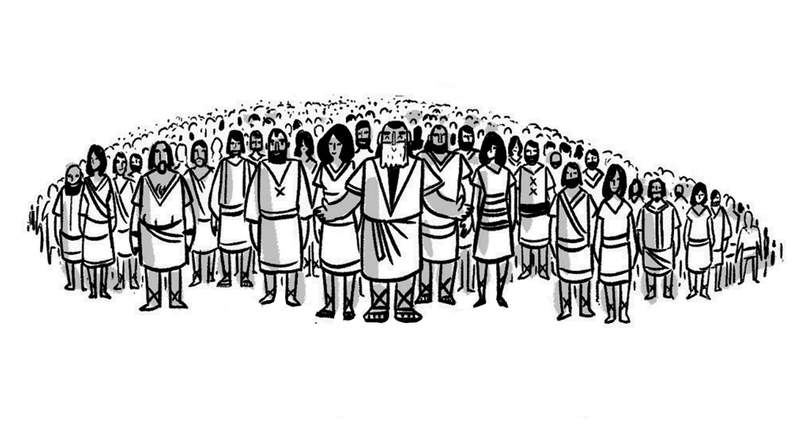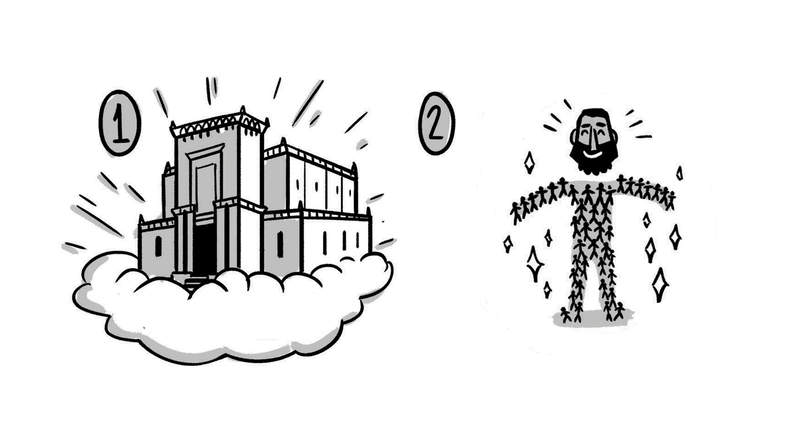The Book of Ephesians
About

The story of how Paul came to the city of Ephesus is really fascinating, and you can read all about it in Acts chapter 19. Ephesus was a huge city, acting as the epicenter for worship of most of the Greek and Roman gods. For over two years, Paul had an effective missionary presence there and converted many people to Christianity. Years later, after being imprisoned by the Romans, he wrote an important letter to the church there.
The movement of thought in the letter divides it into two distinct halves. In the first half (Eph. 1-3), Paul explores the story of the Gospel, how all history came to its climax in Jesus, and his creation of a multiethnic community of followers. The second half (Eph. 4-6) is linked to the first part by the word “therefore.” Paul explores how the Gospel should affect the way we live our lives, personally, in our community, and within our families.
Who Wrote the Book of Ephesians?
Context
Key Themes
- The generous gift of God
- How to walk in a way worthy of God’s gift
- Standing firm in the face of spiritual evil
Structure
Ephesians 1-3: God’s Grace Creating a New Humanity
Chapter 1 opens with a beautiful, Jewish-style poem, in which Paul praises God the Father for the amazing things that he’s done through Christ Jesus. From eternity past, the Father planned to choose and bless a covenant people, which started with Abraham’s family in Genesis 12:1-3. Through Jesus, anyone can now be adopted into that family. His death covers our worst sins and failures, and in him, we can find God’s grace. In fact, that grace has opened up a whole new way to understand life and our entire world. Paul says that God’s purpose has always been “to unify all things in Heaven and Earth under Christ” (Eph. 1:10). In other words, God’s plan was always to have a huge family of restored humans who are unified in Jesus.
This divine purpose first became clear when “we” were first made into that family, referring to ethnic Jews from the family of Abraham. Paul then says that “you,” or non-Jews, heard about Jesus and the salvation through him and were also brought into the family. Paul is referring here to stories recorded in the book of Acts, which tell how the work of God’s Spirit brought Jews and non-Jews together as one family in Jesus, just as God had promised Abraham. In this poem, Paul talks about the Father, Jesus the Son, and the Spirit working together as he tells the story of the Gospel.
After the poem, Paul prays that these Christians would not just know about but truly experience the power of the Gospel. He prays that they would be energized by the same power that raised Jesus from the dead and placed him as the exalted head of the whole world.
In chapter 2, Paul elaborates on key ideas from the poem, beginning with God’s grace. He retells the story of these non-Jewish Christians who came to know Jesus. Before hearing about him, they were physically alive but spiritually dead. They were trapped in a purposeless life of selfishness and sin, deceived by dark spiritual forces of evil. But God, in his great love and mercy, saved them, forgiving all their sins and joining their lives to Jesus’ resurrection life. Now, having been recreated as new human beings through Jesus, they have the joy of discovering the new purpose and tasks God has for them.

In Paul’s story, these new Christians have not only been shown God’s grace but they’ve also been invited into a new family. Before hearing about Jesus, non-Jews were cut off from God as well as his covenant people, the family of Abraham. This was for a practical reason, as the commands of the Sinai covenant formed a boundary line around Israel, like a barrier that kept most non-Jews away. In Jesus, however, the laws of the Torah have been fulfilled and the barrier removed. The two ethnic groups can now become, as Paul puts it, “a new, unified humanity” (Eph. 2:15) that lives together in peace.
In chapter 3, Paul goes on to marvel at the unique role he has had in spreading the Gospel to the Gentiles. Even though he has been imprisoned for it, Paul thanks God for the chance to see the covenant family grow. He closes this first half of the letter with another prayer, this time asking that the people be strengthened by God’s Spirit and grasp the love of Christ.
Ephesians 4-6: Living in Unity as the New Humanity
In the second half of the letter, Paul shifts gears and begins to challenge the Ephesians to respond to the Gospel with how they live out their own life stories. In chapter 4, he begins by focusing on the everyday life of the church, which is actually a big family made up of lots of different kinds of people. He emphasizes that, even with their differences, they are one. This is a key word in this chapter. They are one body, unified by one Spirit, with one Lord and one faith, one baptism to one God. That’s a lot of unity.
But unity does not mean uniformity! Paul explores how Jesus’ unified family consists of lots of different kinds of people, all empowered by the one Spirit to use their unique talents and passions to serve and love one another and build up the Church. Paul develops two related metaphors here. The Church is the new temple, and these communities form a new humanity, a body of people with Jesus as their head. This new human body is the main theme that Paul develops through the rest of the letter.

Paul challenges every Christian to “take off their old humanity” like a set of clothes and “put on their new humanity,” restoring the image of God. Paul continues with a long section that compares the sins of the old to the actions of this new humanity. Instead of lying, these new humans speak the truth. Rather than harboring anger, they peacefully resolve conflicts. They generously give instead of stealing. They encourage others instead of gossiping, and they forgive instead of getting revenge. Rather than continuing in the actions of the old humanity, believers can come under the influence of God’s Spirit. They express this new influence in a few ways, like singing alone or together with Jesus’ followers. The third sign is being grateful for everything, and the fourth is putting themselves under others so as to elevate them as more important.
Paul expands on this fourth sign of the Spirit by describing how it works in a Christian marriage. A Christian wife is to respect and allow her husband to be responsible for her, while the Christian husband is to love his wife and use his responsibility to lay down his life and prioritize his wife's well-being above his own.
Paul says that this kind of marriage is a reenactment of the Gospel story. The husband’s actions mimic Jesus’ loving self-sacrifice, while the wife’s actions represent the Church allowing Jesus to love her and make her new. The same idea applies to the relationship between children and parents as well as slaves and masters.
Paul closes the letter by reminding these Christians of the reality of spiritual evil. There are beings and forces that will try to undermine their unity and new humanity in Jesus. He challenges them to stand firm and put on a metaphorical set of armor, alluding to pieces of body armor that, in the book of Isaiah, describe the Messiah. In other words, Christians need to embody the same values and strengths of Jesus himself; they are his body after all. In a practical sense, this means forming habits, proactively praying and pondering the Scriptures, and depending on one another as we continue to grow as followers of Jesus.
The letter of the Ephesians is Paul’s call to allow the Gospel story about Jesus to reshape every part of our own life stories.